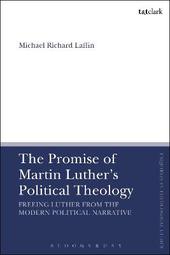
|
The Promise of Martin Luther's Political Theology: Freeing Luther from the Modern Political Narrative
Paperback / softback
Main Details
| Title |
The Promise of Martin Luther's Political Theology: Freeing Luther from the Modern Political Narrative
|
| Authors and Contributors |
By (author) Dr Michael Richard Laffin
|
| Series | T&T Clark Enquiries in Theological Ethics |
|---|
| Physical Properties |
| Format:Paperback / softback | | Pages:272 | | Dimensions(mm): Height 234,Width 156 |
|
| Category/Genre | Theology |
|---|
| ISBN/Barcode |
9780567681225
|
| Classifications | Dewey:261.7092 |
|---|
| Audience | | Tertiary Education (US: College) | |
|---|
|
Publishing Details |
| Publisher |
Bloomsbury Publishing PLC
|
| Imprint |
T.& T.Clark Ltd
|
| Publication Date |
31 May 2018 |
| Publication Country |
United Kingdom
|
Description
Michael Richard Laffin demonstrates the promise of Martin Luther's thought for contemporary political theology by showing how Luther has been over-determined in standard genealogies of modernity which frequently deafen us to his unique contribution. Laffin argues that contemporary theologians have typically followed a narrative derived from the work of a previous generation of political historians and philosophers, which tend to screen out or distort the Reformers' contribution to political theory. Common to these narratives are charges against Luther for his perceived univocal and nominal ontology resulting in a privatized and spiritualized Christianity, thus falsely dividing the world into autonomous spheres. Additionally, the narratives claim that Luther follows in the wake of voluntarism, leading to an insistence on human passivity that leaves no room for pagan virtue. Thus, politics is reduced to an authoritarian imposition of order. In contrast to the dominant narratives of political modernity, Laffin re-examines these narratives by focusing on the political significance of areas in Luther's corpus often neglected in contemporary accounts of his political thought, especially his commentaries on Scripture and writings on the sacraments. Attention to these writings brings forth the crucial themes of the two ecclesiae and the three institutions. Constructively, these themes are deployed in critical engagement with contemporary political theology, particularly as represented in Radical Orthodoxy and the new-Augustinianism.
Author Biography
Michael Richard Laffin teaches theological ethics at the University of Aberdeen, UK.
ReviewsMichael Richard Laffin offers a persuasive friendly amendment to those who critique Martin Luther's theology...this work is a valuable contribution to the ongoing reassessment of Luther's soteriology and offers us a useful orchestration of the voices identifying relational ontology and faith-as-process in Luther's thought ...[this] book deserves a spot in advanced coursework and theological libraries. - Horizons
|